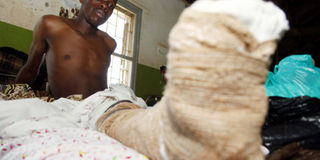The cost of boda boda accidents

Bashiri Bukembe nurse a broken leg at Mulago hospital. The leg was fractured as a result of a boda boda accident. Photos by Stephen Ouma Wandera.
On the streets to the roads in upcountry Uganda, accidents have become a routine that form part of Uganda’s statistics.
At Mulago hospital in the orthopaedics and neurosurgical units is where you get the real picture that comes in form of broken skulls, fractured limbs and people unable to speak or feed. It is a terrible sight whose cost cannot be underestimated.
At the Orthopaedics Unit, you will see legs and limbs suspended on improvised hooks.
It is worse at the neurosurgical unit where patients with tongues hanging out and saliva dripping down their jaws lie. Some patients are seen writhing uncontrollably. This is where brain and spinal injuries are treated.
Zayid Waswa, 24, lies helplessly on a bed at Mulago hospital. He has lost the ability to speak and cannot walk unsupported.
A week ago, Waswa, a mechanic, was knocked by a motorcycle taxi on his way to work in Kakira, Wakiso District.
He now lies on his hospital bed with visible pain written all over his face.
Mariam Nansimbwa with whom they have a baby is by the bed side but is only there to look after Waswa given that the two, months ago decided to end the relationship.
Waswa is one of seven boda boda accident victims that are wheeled around to receive treatment.
Seen worse
Micheal Edgar Muhumuza is the head of the neurosurgery unit and has seen worse as people with crushed limbs and loose flesh soaked in blood are routinely wheeled into the hospital.
But beyond the physical injuries is the financial burden and trauma that has become to define boda bodas.
Some injuries result in death while others require the victim to stay for a relatively long period in hospital which is costly to both the patients and government.
Stella Nanjala fled Kenya in Bungoma to find peace in Uganda having been a target of violence.
However, one fine morning as she crossed Rashid Khamis road at Mukwano Mall, a boda boda cyclist, who was avoiding a collision crushed into her living her for dead.
Police officers picked her up from the scene and rushed her to Mulago hospital, where she currently lies experiencing hallucinations.
Nanjala whose left leg fractured in the hip looks lonely and has no one to attend to her. She is there by herself.
It is 5.30 pm [August 23] and Nanjala, who can’t lift herself off the bed, has not eaten anything since morning. She is only counting on the food that is served by the hospital.
It is a hard life for her as she has to struggle to get food as well as finding good samaritans to wheel her to the washrooms to discharge urine that she passes through a catheter.
In Mulago hospital, there are many more like her and many more across Uganda’s health facilities.
Fresh patients such as Godfrey Kiantankyo, who was knocked by a boda boda in Namuwongo, Kampala are wheeled in daily and many of them unconscious.
According to Kampala Capital City Authority, there are more than 100,000 boda boda cyclists in the Kampala Metropolitan area. It is estimated that there are more than a million boda bodas countrywide.
Mulago hospital, according to Muhumuza, on average receives eight accident victims everyday five of which are believed to be casualties of boda bodas.
This, he says, is exacerbated by the reluctance of passengers to wear helmets thus putting them at the risk of brain damage stroke and incessant unconsciousness.
Waswa Gonzaga, an orthopaedic surgeon at Mulago hospital says it is expensive to treat an accident patient.
The treatment, he says, is anything above 300,000 depending on the nature of the injury. However, he says, complicated cases need more than Shs1m because there are a number of procedures that a patient must go through to return to normal.
The high cost of a bod boda accident
Godfrey Ssebufu, 44, has been lying in hospital helpless after he was knocked by a speeding boda boda in Mityan Town about two weeks ago.
He is a peasant farmer who cannot afford to buy an implant for his fractured left leg.
Besides the implant, he needs to buy crutches or a wheel chair because it will be long before he can move unsupported.
A good wheel chair, Gonzaga says, costs between Shs450,000 and 650,000. This, to an average Ugandan, is a prohibitive cost.
Feeding also becomes another challenge, especially if the patient has to stay in hospital for a long period of time.
Many patients in the hospital cannot afford the bills but rely on social workers, who are only able to provide basics such as food.
Stanley Bubikere, who heads the Disability Prevention and Rehabilitation Programme, says the orthopedic department receives 80 to 100 patients; the old ward receives 40 patients and spine ward about 37 monthly.
This is an overwhelming number and many of the patients, he says, spend days or weeks before they are operated on.
A 2015/16 report from the Ministry of Health indicates that injuries are one of the major causes of disability, with 768,645 cases out of 53,561,472 general ailments being injuries.
Such injures, according to the report, are mainly a result from traffic mistakes and indiscipline.
Boda boda accidents
Injuries. Head injuries, according to Muhumuza, range from minor to severe but have the potential to cause external and internal damages with far-reaching implications.
Victims of boda boda accidents may develop concussion which result from the effects of damaged brains.




